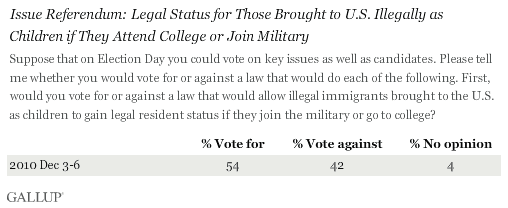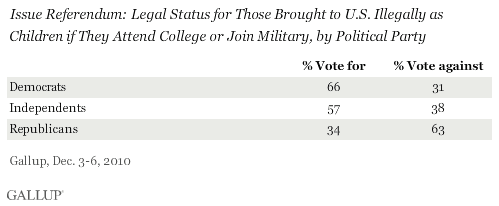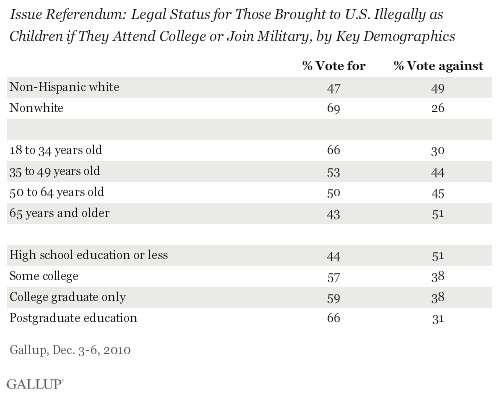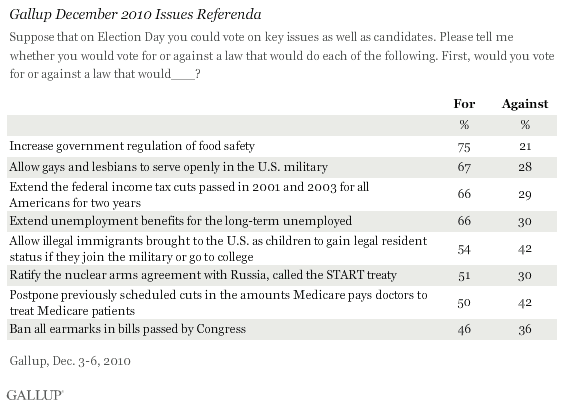PRINCETON, NJ -- Americans are more likely to say they would vote for than against a law that would grant legal status to illegal immigrants brought to the United States as children if they join the military or attend college. This is the major thrust of the DREAM Act legislation Congress is now considering to provide a path to citizenship for thousands of young adults living in the United States illegally.

The DREAM Act, whose formal name is the Development, Relief, and Education for Alien Minors Act, narrowly passed in the U.S. House of Representatives Wednesday. The U.S. Senate delayed a scheduled vote Thursday on the bill because Senate leaders did not have the votes necessary to pass it. Its fate is now uncertain as the end of the lame-duck session nears. Congressional supporters, including most Democrats, see the bill as an opportunity for young adults who have proven to be productive members of society to gain legal status. Opponents, including most Republicans, are concerned that the legislation would grant amnesty to those here illegally and may encourage more illegal immigration in the future.
It is not clear to what extent Americans are familiar with the particulars of the DREAM Act, because the legislation has not received as much attention as other issues Congress is dealing with, such as the extension of the 2001 and 2003 tax cuts. But the poll indicates Americans' top-of-mind responses to a proposal similar to the DREAM Act are more positive than negative.
Reflecting the political divides in Congress on the issue, most Americans who identify as Democrats say they would vote for such legislation if they could do so, while most Republicans would vote against it. Independents' views are more similar to Democrats' than to Republicans' views.

Non-Hispanic whites are divided as to whether they would vote for legislation similar to the DREAM Act, while nonwhites favor it by a better-than 2-to-1 margin. The poll did not include a large enough sample of Hispanics to provide reliable estimates of that group's support, though the data suggest they largely favor it.
Support varies by education and age, with younger and more educated Americans the most likely to say they would vote for such legislation, and older and less educated Americans least likely to do so.

Support for a law similar to the DREAM Act is on the lower end of eight issues Gallup tested in its recent referendum question, and trails that for increasing government regulation of food safety, extending the 2001 and 2003 income tax cuts, extending unemployment benefits, and allowing gays and lesbians to serve openly in the U.S. military.

Additionally, a USA Today/Gallup poll conducted last month found Americans placing a lower priority on legislation to provide a path to citizenship for young adults here illegally, compared with other issues Congress was likely to take up in its lame-duck session.
Implications
Americans are more inclined to support than oppose legislation similar to the DREAM Act now under consideration in the Senate. That legislation would begin to address the status of some illegal immigrants already in the country. The decision to postpone action on the bill could seal its fate. With the American public placing a lower priority on legislation like the DREAM Act, there may not be much external pressure for Congress to act on it before its session ends.
Survey Methods
Results for this Gallup poll are based on telephone interviews conducted Dec. 3-6, 2010, on the Gallup Daily tracking survey, with a random sample of 1,003 adults, aged 18 and older, living in all 50 U.S. states and the District of Columbia, selected using random-digit-dial sampling.
For results based on the total sample of national adults, one can say with 95% confidence that the maximum margin of sampling error is ±4 percentage points.
Interviews are conducted with respondents on landline telephones (for respondents with a landline telephone) and cellular phones (for respondents who are cell phone-only). Each sample includes a minimum quota of 150 cell phone-only respondents and 850 landline respondents, with additional minimum quotas among landline respondents for gender within region. Landline respondents are chosen at random within each household on the basis of which member had the most recent birthday.
Samples are weighted by gender, age, race, education, region, and phone lines. Demographic weighting targets are based on the March 2009 Current Population Survey figures for the aged 18 and older non-institutionalized population living in continental U.S. telephone households. All reported margins of sampling error include the computed design effects for weighting and sample design.
In addition to sampling error, question wording and practical difficulties in conducting surveys can introduce error or bias into the findings of public opinion polls.
View methodology, full question results, and trend data.
For more details on Gallup's polling methodology, visit www.gallup.com.
